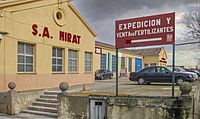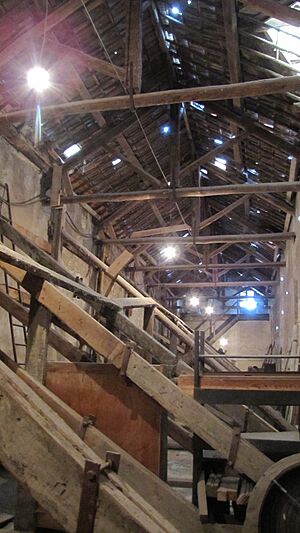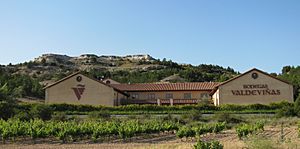Mirat facts for kids
 |
|
| S.A. (corporation) | |
| Industry | Agriculture |
| Founded | 1812 |
| Headquarters | , |
|
Area served
|
European Union and North Africa |
| Products | Manure, fertilizer, gardening,... |
| Revenue | €83 million |
|
Number of employees
|
183 |
Mirat is a Spanish company that started way back in 1812 in a city called Salamanca. It's also known as Grupo Mirat (Mirat Group). This company mainly makes products like manure and fertilizer to help plants grow.
Today, Mirat is one of the 100 biggest companies in the region of Castile and León. It's also the largest company in the farming business in the province of Salamanca. Mirat sells its products mostly in Spain and Portugal.
One of its most famous brands is Vitaterra. This brand is the biggest Spanish maker of garden manures and fertilizers.
The Mirat factories are special because they are the only well-preserved examples of 19th-century industry in Salamanca. Inside the factory, you can still find parts of an old building. This building was once the Convent of Nuestra Señora de la Victoria (Our Lady of the Victory). It was built in the 1400s and belonged to a group of monks called the Hieronymites.
Contents
The Story of Mirat

The Mirat company began in 1812. That year, a man named Gregorio Mirat opened a factory in Salamanca. His factory made starch, which was used for many things.
Later, Gregorio's son, Juan Casimiro, was born in 1841. Juan Casimiro would become very important for the company. In 1853, Gregorio brought his son into the business. After that, the factory was called "Mirat e Hijo," which means "Mirat and Son."
Juan Casimiro learned a lot during a trip to France. In 1876, he helped the company start selling its products to other countries. In the same year, the factory moved to a new spot near the river Tormes. This new location was close to an old building called the Convent of Saint Jerome.
In 1881, the factory started making rice starch. This type of starch was very important for ironing clothes. Around this time, Mirat became one of the first factories in Salamanca to use steam power. This was a big step forward!
The company also had a storage building near the old main square. In 1902, Casimiro decided to rebuild it. He turned it into small hotels. That's why even today, that area is known as "Avenida de Mirat" (Mirat Avenue).
In 1933, the company changed how it worked. It became a cooperative association. Then, in 1963, Mirat started making mixed manures. The factory building is still a great example of industrial buildings from the 1800s in Salamanca.
The Old Convent Inside the Factory
Inside the Mirat factory workshops, you can find parts of the Convent of Nuestra Señora de la Victoria. This convent belonged to the Order of Saint Jerome. It was built in 1490. After being successful for about 300 years, it was damaged by French soldiers during a war.
After the war, different businesses tried to use the area. Many parts of the convent were torn down. But then, the Mirat family took over the land. They started making manures there. They used the parts of the religious building that were still in good shape.
Even now, the factory has parts of the old convent's walls and cellars. One amazing part is a huge vaulted arch. It is 3 meters wide! This arch was designed by Juan de Álava. He was a famous designer who also worked on other important buildings in Salamanca.
You can also see old chimneys, 16th-century workshops, tall brick arcades, and arches. These all show how the area changed from a convent to a busy industrial site.
What Mirat Group Does

The Mirat Group has many different parts. Here are some of the things they do:
- Fertilizers: They make products to help plants grow strong.
- Seeds: They sell seeds for farming.
- Gardening Products: This includes brands like Vitaterra, Vitaterra Nature, and Mas Plant. Vitaterra is the biggest Spanish company making garden manures and fertilizers.
- Wineries: They own wineries like Valdeviñas. Their wines include Mirat, Tinar, and Torrelanga.
- Agricultural Machinery: They deal with machines used for farming.
- Fuel Distribution: They help deliver fuel.
- Bus Lines: They also run bus services.
- Service Points: They have places where people can get help or buy products.
- Plant Health: They offer products and advice to keep plants healthy.
Gallery
-
Old premises of the Convent of Our Lady of Victory
-
Inside the old buildings of the convent
-
Detail of an 18th-century baroque door inside the workshops
-
Detail of an arch above the monastery, probably work of Juan de Álava
See also
 In Spanish: Mirat para niños
In Spanish: Mirat para niños
- Industry in Spain
- Agriculture in Spain
- Manure
- Fertilizer
 | Selma Burke |
 | Pauline Powell Burns |
 | Frederick J. Brown |
 | Robert Blackburn |





